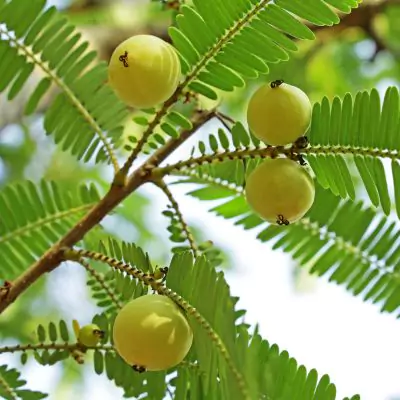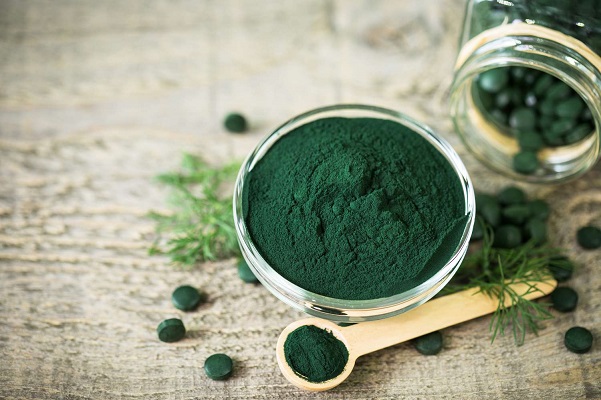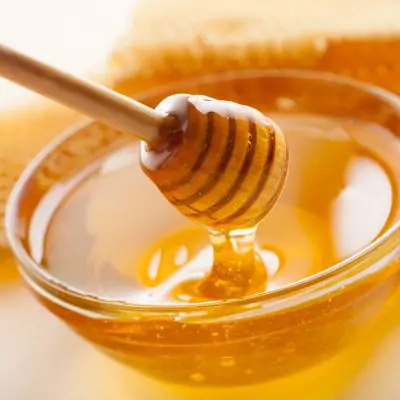On This Page
Overview
Amla, also known as Amalaki or Indian Gooseberry, is a highly effective herb because of its countless therapeutic benefits. Amla has countless health benefits due to its abundance of vitamin C, calcium, iron, phosphorus, carotene, vitamin B, protein, and fiber.
During rites in the Hindu month of Kartik, which normally falls between October and November, amla has significant religious importance. It is customary in many regions of India to present the fruit to Lord Shiva as a Naivedya and consume it to prevent different respiratory diseases, the common cold, the flu, and other health issues.
Synonyms of Gooseberry
- Phyllanthus Emblica
- Emblic
- Emblic myrobalan
- myrobalan
- Indian gooseberry
- Malacca tree
- Amla
Nutritional Facts of Gooseberry
| Energy: | 44 kcal |
| Carbohydrates: | 10.18 g |
| Dietary fiber: | 4.3 g |
| Fat: | 0.58 g |
| Protein: | 0.88 g |
Phytochemical Constituents of Gooseberry
- Ellagic acid
- Chebulinic acid
- Gallic acid
- Chebulagic acid
- Apigenin
- Quercetin
- Corilagin
- Luteolin
Therapeutic Uses of Gooseberry
- Digestion
Amla berries have an adequate amount of soluble dietary fiber. Irritable bowel syndrome may be alleviated by the fiber’s involvement in controlling bowel movements. Amla aids in a good number of important minerals being absorbed because of its greater vitamin C content. As a result, it works well with various health supplements.
- Brain Health
Amla improves memory by combating the body’s free radicals, which are capable of quickly attacking and damaging brain cells. The antioxidant quality contributes to brain health.
- Improves eyesight
Amla’s carotene has been found in studies to enhance vision. Consuming amla regularly has also been associated with an increase in overall eye health because it helps to avoid redness, itching, and watering of the eyes as well as cataract issues and intraocular tension (the pressure you feel).
- Cures sore throat and cold
Amla has antiviral qualities and strengthens the body’s immune system. Amla can be fairly helpful in treating colds and sore throats if taken along with ginger and honey.
- Builds immunity
The astringent and antibacterial qualities of amla strengthen the immune system. Oxidative damage is a major contributor to many health issues, including cancer. When body cells consume oxygen, they produce dangerous byproducts known as free radicals. Amla can stop this oxidation and aid in cell protection because it is a strong antioxidant.
- Beautifies hair
Amla is a well-proven tonic for hair, just like curry leaves. It contains a lot of necessary fatty acids, which deeply enter the hair follicles to prevent dandruff, slow down the onset of graying, and strengthen the hair follicles.
The high iron and carotene content of this tart fruit promotes hair development. Amla also functions naturally as a conditioner, giving you silky, gleaming hair.
Home Remedies Gooseberry
- Relieving asthma
Amla juice twice a day aids with the difficulties of bronchitis and asthma.
- For dehydration
Take an amla liquid to replenish lost fluids and balance your electrolytes if you’re dehydrated. (raw amla, water, rock salt, candy sugar, and black pepper powder).
- Sore Throat
Making candy from amla powder, candy sugar powder, honey, salt, ginger, and lemon juice not only soothes sore throats but is also a better option for kids than regular candy.
- Gonorrhea
Gonorrhea can be treated using the juice of the Amla bark, honey, and turmeric (Haldi).

Have A Health Issue?
Consult Online
- Dr. Sahil Gupta (B.A.M.S., M.H.A.)
Ayurvedic Allergy Specialist
CEO & Founder of IAFA®
Ayurvedic Aspects of Gooseberry
Due to its ability to balance the three doshas of Kapha, Pitta, and Vista, amla has long been used as a treatment for a variety of illnesses according to Indian Ayurveda. Amla or Amalaki also referred to as a Rasayana, is regarded as a divine therapy in Ayurveda. Rasayana is a term for a premium herbal product with exceptional revitalizing, and longevity, that guarantees the harmony of the mind and body.
This miraculous fruit balances the body’s three doshas—vata, Kapha, and pitta—and treats digestive issues, boosts immunity, acts as an astringent, and benefits all body types.
Amla is a fundamental component of every well-known ayurvedic formula.
Side Effects of Gooseberry
- Not for hypotension patient
Amla has excellent qualities to lower and maintain blood pressure because it is acknowledged for assisting with hypertension. However, if you have hypotension or low blood pressure, it is advised to avoid consuming too much amla and to engage in exercise to maintain a healthy blood pressure level.
- Allergy
Amla may cause allergic reactions in some people. A person who is allergic to this fruit may develop a variety of health problems, including headaches, dizziness, itching, nausea, vomiting, redness, diarrhea, abdominal discomfort, swelling around the mouth, difficulty breathing, and nausea.
- It can make stool hard
Amla’s high fiber content makes it a well-known treatment for constipation. But excessive drinking can make the stool more rigid.
Conclusion
Amla has been used regularly in Ayurveda for many years to cure a variety of illnesses. This superfood contains a variety of nutrients and properties that promote better health. It is a convenient consumable due to its variety of uses. Furthermore, it offers a host of health advantages. Add it to your routine and take pleasure in living healthily.
The main thing to keep in mind when consuming amla is how much you’re taking in. Amla is a very healthy food when consumed cautiously and in moderation. But if amla consumption is not monitored, it can also result in several issues. As a result, it is advised to see a health expert to add it to your diet. In case of allergies or any side effect you face due to amla or you encounter amla allergy you should consult Dr. Gupta at IAFA®. He cures allergies and other health issues through the ayurvedic approach.
References
- Krishnaveni M, Mirunalini S. Therapeutic potential of Phyllanthus Emblica (amla): the ayurvedic wonder. J Basic Clin Physiol Pharmacol. 2010;21(1):93-105.
- https://en.wikipedia.org/wiki/Gooseberry
- https://www.sciencedirect.com/topics/biochemistry-genetics-and-molecular-biology/emblica-officinalis#:~:text=The%20fruit%20of%20Amla%20is,corilagin%2C%20leutolin%2C%20etc.)










